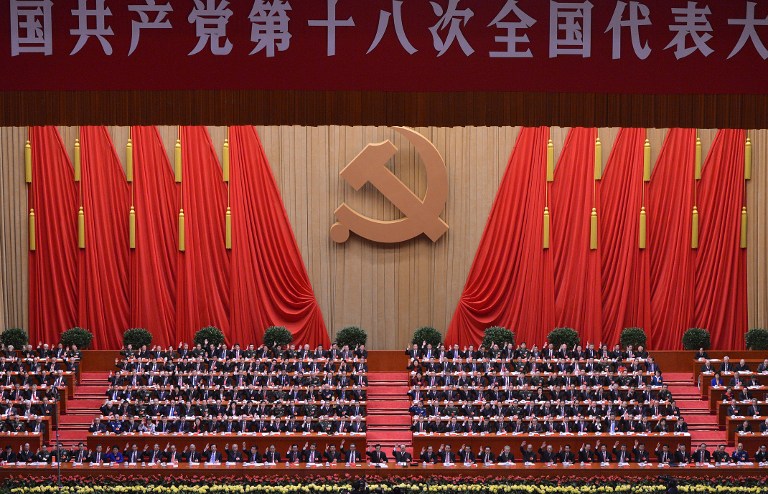SUMMARY
This is AI generated summarization, which may have errors. For context, always refer to the full article.

BEIJING, China (UPDATED) – China’s ruling Communist Party closed a pivotal congress Wednesday that put Vice President Xi Jinping a step closer to taking power for the next decade in a landmark transition.
The week-long Communist Party gathering in the cavernous Great Hall of the People ended after its 2,200 delegates from around the country selected a new leadership committee of roughly 200 party members.
Xi was renamed to the Central Committee, a widely expected development that was singled out in a report by state media, suggesting he was firmly positioned to be announced as the party’s top leader on Thursday.
The week-long forum ended with a show of unity by the delegates in the red-draped hall, who stood and sang the “Internationale,” the socialist anthem.
The last word went to President Hu Jintao, who opened the meeting with an address warning the party faces the threat of “collapse” if it cannot rein in rampant corruption.
“I now announce that the 18th Chinese Communist Party Congress has come to a victorious conclusion,” said Hu, the outgoing party leader.
“The congress has elected a new central committee of the party and replaced older leaders with younger ones.”
The main business of the congress, which is held every five years, was to select a new circle of leaders at a time when China faces major economic challenges and growing scrutiny from its citizens.
The party did not immediately release the full Central Committee list.
However, state news agency Xinhua reported the appointments of a number of officials from each of the two main factions that observers believe are jockeying for power, suggesting give-and-take in the backroom dealings.
In one corner is octogenarian former president Jiang Zemin, who is seen as a kingmaker after making a surprise political comeback, while the other faction comprises Hu’s allies.
Besides singling out Xi, considered a consensus figure who leans toward Jiang, Xinhua mentioned in the same dispatch that Hu protege Vice Premier Li Keqiang was also re-appointed to the committee.
Li is tipped to become China’s next premier in March, when Xi is expected to be named president.
Xinhua also singled out about a dozen other officials who have been tipped for inclusion in the Politburo Standing Committee, China’s elite power grouping which is to be unveiled on Thursday when its members march onto the stage.
Only the line-up of the standing committee — currently at nine members but likely to be reduced to seven — and its pecking order will provide certainty on the factional outcome.
Analysts say that despite rivalries between the two camps which are largely divided on patronage lines, they broadly agree China must reform its economy away from a dependence on exports, while maintaining a firm hand on dissent.
Xi’s ascension has been expected since 2007, when he was given a position on the standing committee. That indicated his status as heir apparent to Hu, who officially relinquishes party control this week.
Xi is expected to complete his takeover in March when China’s rubber-stamp legislature officially names him the nation’s president, while Li is strongly believed destined for the premiership, replacing incumbent Wen Jiabao.
They are expected to serve two five-year terms.
The pair will take over at a time when China’s powerhouse economy is suffering a rare slowdown, undercutting the party’s key claim to legitimacy — continually improving the livelihoods of the country’s 1.3 billion people.
Leaders also face localized unrest across China, typically sparked by public rage at corruption, government abuses or the myriad manifestations of anger from the millions left out of the country’s newfound prosperity.
Anti-Chinese unrest in ethnic Tibetan areas has also flared with a spate of self-immolation protests over the past week.
The congress unanimously approved a report on corruption in the party and further amended the Communist charter to call on the party to “support ecological progress,” a reference to the environmental destruction that has accompanied China’s boom.
Beijing has ramped up security in Beijing and on rambunctious media sites to prevent any criticism during the gathering.
The run-up to this year’s congress was unsettled by the scandal surrounding Bo Xilai, a one-time political star whose ambitions were torpedoed when his wife was given a suspended death sentence for the murder of a British businessman. – Carol Huang, Agence France-Presse
Add a comment
How does this make you feel?
There are no comments yet. Add your comment to start the conversation.